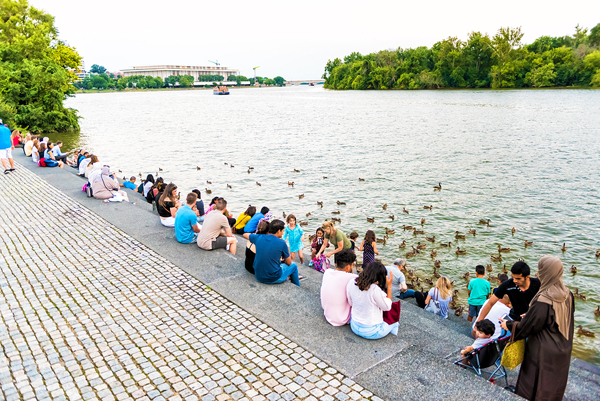Retire in Washington DC Guide
Summary: If Washington DC is on your retirement radar, our detailed Retire in Washington DC Guide is your go-to resource. Delve into the crucial aspects of life here, including living costs, climate, housing options, healthcare services, and residency procedures. We also explore the city's social dynamics, volunteering scenes, transportation, and how walkable its neighborhoods are.

Retiring in Washington DC offers a unique blend of cultural richness, historical significance, and urban convenience. The city is a popular choice for international retirees due to its vibrant arts scene, world-class healthcare facilities, and diverse culinary offerings. However, like any major city, it also presents its own set of challenges, including a high cost of living and navigating the complexities of the American healthcare system.
Cost of Living
Washington DC is known for its high cost of living. Housing, in particular, can be quite expensive, with the median home price significantly higher than the national average. However, retirees may find that the city's wealth of amenities and services, such as excellent public transportation and proximity to healthcare facilities, offset these costs.
Climate
The city experiences a humid subtropical climate, with hot, humid summers and mild to cool winters. Spring and autumn are particularly pleasant, with moderate temperatures and beautiful foliage. However, retirees from colder climates may need some time to adjust to the city's humid summers.
Healthcare
Washington DC is home to some of the nation's top hospitals, including MedStar Washington Hospital Center and George Washington University Hospital. The city's healthcare system is robust, offering a wide range of specialists and services. However, navigating the American healthcare system can be complex for international retirees, particularly when it comes to insurance coverage.
Public Healthcare System
While the U.S. does not have a public healthcare system in the same way that many other countries do, Washington DC offers several programs to help seniors with healthcare costs. However, eligibility for these programs can be complex and may depend on factors such as income and residency status.
Residency Options for Retirees
International retirees have several options for residency in Washington DC. These include purchasing property, obtaining a long-term visa, or becoming a permanent resident. Each option has its own set of requirements and processes, so it's important to research and plan ahead.
Parks and Recreational Activities
Washington DC is home to numerous parks and recreational areas, including the National Mall, Rock Creek Park, and the Tidal Basin. These offer ample opportunities for walking, biking, and enjoying the outdoors. The city also hosts a variety of cultural events and festivals throughout the year.
Restaurants
The city's culinary scene is diverse and vibrant, with options ranging from high-end dining to food trucks. Some popular, reasonably priced options include Ben's Chili Bowl, a DC institution known for its chili dogs, and Founding Farmers, a farm-to-table restaurant with a focus on sustainable and locally sourced ingredients.
Learning the Language
While English is the primary language spoken in Washington DC, the city is home to a diverse population and many residents speak other languages. For those looking to improve their English skills, the Washington English Center offers affordable language classes.
Local Culture
Washington DC is a city of neighborhoods, each with its own unique character and culture. The locals are generally friendly and welcoming, and the city's international population means that retirees from around the world can find a sense of community.
Meeting People and Volunteering
There are numerous opportunities for retirees to meet people and get involved in the community. Volunteering is a popular option, with organizations such as AARP DC and the DC Volunteer Center offering a variety of opportunities. Additionally, the city's many museums, cultural institutions, and community centers offer classes and events where retirees can meet like-minded individuals.
Housing Options
Retirees in Washington DC have a range of housing options to choose from, including condos, apartments, and single-family homes. Many choose to live in the city center for its convenience and walkability, while others prefer the quieter, more residential neighborhoods outside of the city.
Transportation
Washington DC is a walkable city with an extensive public transportation system, including the Metro, buses, and bike share programs. While having a car can be convenient for trips outside of the city, many retirees find that they can get by just fine without one.
About the Author
 Joshua Wood, LPC joined Expat Exchange in 2000 and serves as one of its Co-Presidents. He is also one of the Founders of Digital Nomad Exchange. Prior to Expat Exchange, Joshua worked for NBC Cable (MSNBC and CNBC
Primetime). Joshua has a BA from Syracuse and a Master's in Clinical and Counseling Psychology from Fairleigh Dickinson University. Mr. Wood is also a licensed counselor and psychotherapist.
Joshua Wood, LPC joined Expat Exchange in 2000 and serves as one of its Co-Presidents. He is also one of the Founders of Digital Nomad Exchange. Prior to Expat Exchange, Joshua worked for NBC Cable (MSNBC and CNBC
Primetime). Joshua has a BA from Syracuse and a Master's in Clinical and Counseling Psychology from Fairleigh Dickinson University. Mr. Wood is also a licensed counselor and psychotherapist.
Some of Joshua's articles include Pros and Cons of Living in Portugal, 10 Best Places to Live in Ireland and Pros and Cons of Living in Uruguay. Connect with Joshua on LinkedIn.
Additional Information:
- Pros & Cons of Living in Washington DC
- Cost of Living in Washington DC
- Health Care in Washington DC
- Discovering the Best of Washington DC
- Healthcare in Washington, DC
- Washington, D.C.
- Best Places to Live in Washington, DC
- Healthcare & Health Insurance in Wash DC
- Real Estate in Wash DC
- 5 Tips For Tech Jobs in Washington DC


